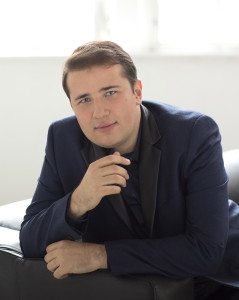Since Stanislav Khristenko won First Prize at the 2013 Competition, we have received many inquiries from orchestras and presenters around the U.S. who wish to engage him for an upcoming season. Venues that have presented CIPC winners for years, as well as those that are new, recognize Stanislav’s engaging personality and mastery at the keyboard. He will be very busy for the next three years!
In January, CIPC Executive Director Pierre van der Westhuizen and Artist Manager Della Homenik will introduce Stanislav at the annual conference of the Association of Performing Arts Presenters in New York. This important networking event is a must for building contacts and securing future engagements.
In the meantime, we caught up with Stanislav to see how his big win at the CIPC has affected his life and his career.
1. We remember reading that you felt winning the Competition was a wonderful new beginning for you. Please elaborate.
It has been three months since my final round performance with The Cleveland Orchestra at Severance Hall and now it is completely clear to me that winning the Cleveland International Piano Competition totally changed my life. Concert engagements that are being offered to me as the winner of the competition are vitally important for my artistic growth. Every performance is a huge professional boost and these next three years will be a valuable time for my further improvement. This prize didn’t only bring me lots of happiness and excitement but more importantly hope and inspiration.
There are many people who think that piano competitions these days are just factories “producing competition winners.” The competitions that discovered the names of Emil Gilels, Van Cliburn, Murray Perahia, Mitsuko Uchida, and Mikhail Pletnev, among many others, were the ones who brought those pianists their first important engagements. It was more than a prize – these engagements resulted in their further professional and career achievements and put them on the top of the field. Unlike most competitions of our time, the Cleveland Competition really starts performance careers of its winners, which sets it apart from any music competition of the 21st century. And my goal for the next three years is to prove that the Cleveland International Piano Competition is producing “musicians” rather than just “competition winners.”
 2. What are you doing to make sure the next three years have as much of an impact as possible on your career?
2. What are you doing to make sure the next three years have as much of an impact as possible on your career?
It is very important for me to be able to offer concert presenters a variety of repertoire. For example, some orchestras prefer to have particular piano concertos, some concert series are interested in works of particular composers or genres, some presenters would like to have chamber music as part of the performance. I am trying to make sure that my choice of repertoire interests the audience and the level of preparation is the best possible. I think this is the most important.
3. Are you learning any special new works now that you will be concertizing so extensively?
I am currently trying to rethink my way of putting together a recital program. There are several repertoire directions that I am planning to explore. First, I have always been interested in the work and careers of expatriate composers – those individuals who for one reason or another left their home country. Famous examples include Frédéric Chopin, Igor Stravinsky, Sergei Rachmaninov, and Béla Bartók, the last two of whom spent considerable time in the U.S. Many composers, like Arnold Schoenberg, fled to this country from the Nazis. Some, like Alexander von Zemlinsky, were not able to successfully establish themselves in their adopted country. Ernst Krenek (my second CD of his works is planned to be recorded next March) was an example of a prolific composer’s stay in this country. Works of these composers will be included in one of my new programs.
My other interest is Russian music that was originally written for the ballet but proved to be one of the classical music highlights. I have previously performed “Petrouchka” by Stravinsky, excerpts from “Romeo and Juliet” by Prokofiev and “Sleeping Beauty” by Tchaikovsky. Adding transcriptions from “Anna Karenina” by Rodion Shchedrin, Tchaikovsky’s “Nutcracker” and my own transcriptions of excerpts from Aram Khachaturian’s ballet would hopefully make an exciting program to listen to.
Finally, music that was influenced by World War II and the impact of this war on the arts is another profound topic for me. Some works were composed outside of actual hostilities (for example, Prokofiev’s “War Sonatas” or Krenek’s Sonata No. 3) but expressed artists’ reaction. There are some works that were composed in ghettos and were reflections of fear and sorrow. This repertoire has a special importance to me as it is related to my family.
4. Who or what inspires you the most artistically? Why?
I am trying to learn a lot from people outside of classical music. It even includes some pop music artists. Theater is the closest field in the arts to classical music performance and a great example of live energy exchange. Visual arts, especially video art, is a huge inspiration as it reflects contemporary ideas using technology of our time. And, of course, nature is the biggest inspiration as it is a subject of endless exploration.
5. What is your favorite memory from the 2013 Competition?
Doesn’t the final result of the Competition deserve to be my favorite memory? It is the best memory I could ever dream about…

